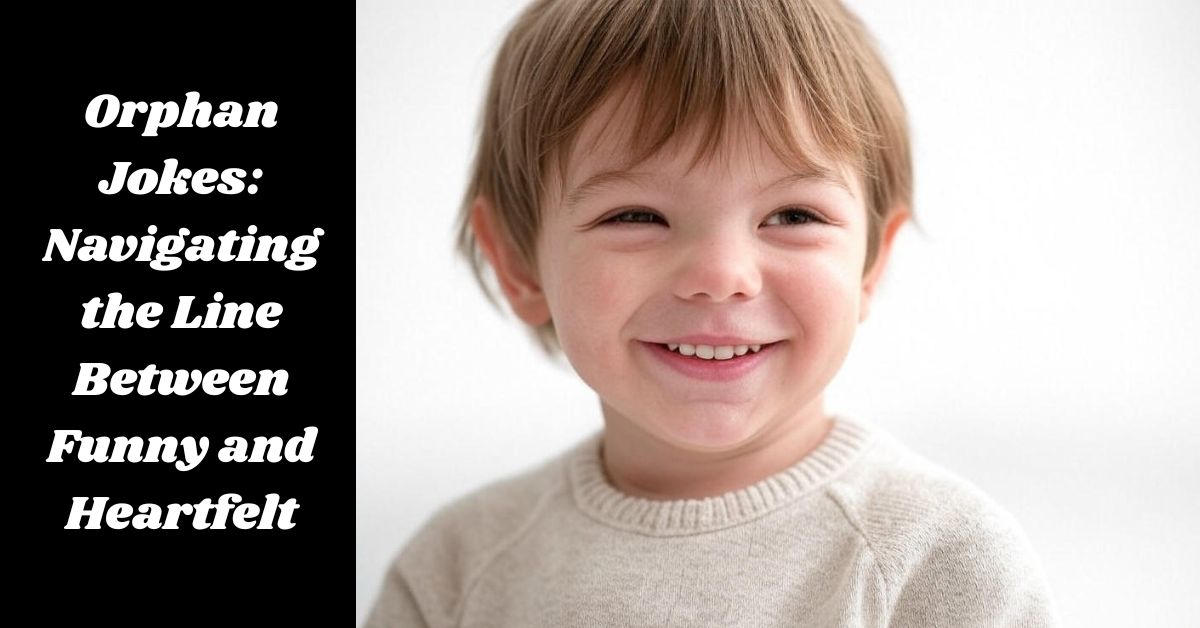Humor often teeters between laughter and discomfort. Orphan puns represent a unique category of dark humor that balances on this edge. These jokes use clever wordplay to transform sensitive topics into unexpected moments of levity.
The best orphan puns create that distinctive combination of amusement and unease that makes them memorable. Let’s explore this fascinating intersection of comedy and sensitivity.
Best Orphan Puns So Bad They’ll Make You Laugh Then Cry
- Every orphan pun contains an element of surprise that catches listeners off guard.
- The unexpected twist in these jokes creates the perfect balance of humor and discomfort.
- Most orphan jokes play with dual meaning words related to family, belonging, and identity.
- The contrast between the serious subject and playful delivery creates memorable comedic moments.
- Many people find these jokes funny precisely because they challenge social comfort zones.
- The best orphan puns contain layers of linguistic connections that reveal themselves slowly.
- These jokes often use homonyms to create unexpected interpretations of common phrases.
- The element of surprise in well-crafted puns triggers both laughter and reflection.
- Many orphan jokes rely on semantic ambiguity to deliver their punchlines effectively.
- The shock value of these jokes often comes from their unexpected word associations.
- People remember these puns because they create a unique emotional experience.
- The contrast between lighthearted delivery and serious subject matter makes these jokes distinctive.
- Many of these puns use metaphorical language to disguise their deeper meanings.
- The cognitive dissonance created by these jokes contributes to their memorability.
- Well-crafted orphan puns balance cleverness with sensitivity to avoid causing offense.
Orphan Puns: A Humorous Look at a Sensitive Topic
- Coping mechanisms often develop through humor around difficult subjects.
- Many people use laughter as a way to process complex emotions about challenging topics.
- Orphan puns create distance that allows engagement with sensitive subjects.
- These jokes serve as an entry point for conversations that might otherwise feel uncomfortable.
- The best orphan humor acknowledges both the laughter and tears inherent in difficult situations.
- Comedy wordplay provides a safe container for exploring emotionally charged topics.
- Many orphan jokes contain a thread of resilience beneath their humorous exterior.
- Self-deprecating humor often appears in jokes created by those with personal experiences.
- Cultural attitudes toward orphan-related humor vary significantly across different societies.
- These jokes function differently depending on who tells them and in what context.
- The line between amusing and offensive varies greatly among different individuals.
- Orphan humor exists within a long tradition of comedy that addresses tragedy.
- People often bond over shared laughter even when the topic seems inappropriate.
- The best puns in this category rely on clever linguistic connections rather than cruelty.
- Sensitive humor requires awareness of audience and context to land effectively.
Adopting Orphan Puns: Finding the Laughter
- Adoption humor creates opportunities for clever linguistic connections.
- Many jokes about adoption focus on the positive aspects of creating new families.
- Humor helps normalize discussions about different family structures.
- People often use these jokes to process their own experiences with adoption.
- Comedians with personal connections to adoption create the most insightful material.
- Laughter brings people together around topics that might otherwise feel uncomfortable.
- Puns about finding homes play with lexical ambiguity in creative ways.
- The contrast between serious topics and playful language creates memorable jokes.
- Many orphan wordplay jokes celebrate the formation of loving families.
- Jokes in this category often center on themes of belonging and identity.
- The element of surprise makes these adoption puns especially effective.
- People share these jokes to break tension around sensitive family discussions.
- Humor serves as an entry point for more serious conversations about adoption.
- Clever jokes avoid mockery while still finding humor in unique situations.
- Cultural references to adoption appear frequently in this category of humor.
Orphan Jokes: Navigating the Line Between Funny and Heartfelt

- Comedians must balance humor with sensitivity when crafting orphan jokes.
- The best puns acknowledge emotional reality while still finding humor.
- Many successful jokes focus on resilience humor rather than misfortune.
- Wordplay allows people to address difficult topics through indirect means.
- Effective orphan humor avoids mocking actual orphans or their circumstances.
- Audiences respond best to jokes that come from a place of understanding.
- Skilled comedians use these jokes to highlight social issues in accessible ways.
- The intention behind the joke matters as much as the content itself.
- Emotional framing serves as a bridge between difficult emotions and everyday conversation.
- People appreciate jokes that acknowledge both the laughter and tears in life.
- Comedians with personal connections to the topic often create the most authentic material.
- Successful jokes create moments of shared understanding among diverse audiences.
- The best orphan humor contains elements of hope alongside the comedy.
- Timing plays a crucial role in determining whether a joke succeeds or fails.
- Comedians must read their audience carefully when delivering sensitive material.
READ THIS BLOG: Is Cutsco2d Software Safe to Download: A Comprehensive Review
The Psychology Behind Orphan Humor: Why We Laugh
- Psychologists identify humor as a defense mechanism against uncomfortable feelings.
- People use laughter to process emotions too difficult to face directly.
- Our brains experience relief when tension dissolves through unexpected humor.
- Researchers note that dark humor can indicate psychological resilience.
- Laughter triggers endorphin release that counteracts negative emotions.
- Studies show that humor helps people address topics they might otherwise avoid.
- Shared laughter creates community bonds even around difficult subjects.
- Our minds appreciate the linguistic puzzle of resolving incongruity in jokes.
- Psychologists observe that humor often develops as a coping skill in childhood.
- People with personal experience of hardship often develop sophisticated humor.
- Research indicates that humor helps maintain psychological distance from trauma.
- The surprise element in good puns activates pleasure centers in our brains.
- Humor serves as a social tool that facilitates discussions about taboo subjects.
- Studies demonstrate that laughter improves overall mental wellbeing.
- Our brains process jokes through multiple cognitive and emotional pathways.
Orphan Puns and Wordplay: A Linguistic Exploration
- Linguists study puns as examples of semantic relationships creation in language.
- Orphan puns typically rely on homonyms or words with multiple interpretations.
- The brain experiences pleasure when resolving the linguistic puzzle in puns.
- Language allows us to transform serious topics into playful communication.
- Most orphan puns play with expectations through creative word associations.
- Linguists classify these jokes based on their phonetic structure and semantic components.
- The surprise element in good puns creates cognitive satisfaction.
- Many languages contain similar wordplay humor around family-related topics.
- Researchers note that puns require sophisticated language processing abilities.
- Successful wordplay depends on shared contextual meaning among listeners.
- Language provides tools for addressing difficult topics through indirect means.
- The best puns contain multiple layers of meaning for audiences to discover.
- Many orphan jokes rely on metaphors that connect unexpected concepts.
- Linguists observe that humor often emerges at the boundaries of language rules.
- Cultural context significantly influences which puns people understand and appreciate.
Orphan Jokes in Popular Culture: From Literature to Film
- Authors have incorporated orphan characters in stories throughout literary history.
- Charles Dickens featured numerous orphan protagonists in his influential novels.
- Many classic fairy tales center on orphaned children facing various challenges.
- Filmmakers often use orphan characters to create instant audience sympathy.
- The orphan archetype appears consistently across diverse cultural storytelling traditions.
- Harry Potter represents one of the most famous orphan characters in modern literature.
- Comedians frequently reference orphan themes when discussing identity humor.
- Superhero stories commonly feature orphaned protagonists like Batman and Superman.
- Annie stands as perhaps the most recognized orphan character in American musical theater.
- Writers use orphan characters to explore themes of self-discovery and belonging.
- The orphan narrative creates natural opportunities for character growth and development.
- Popular culture often portrays orphans as uniquely resourceful and independent.
- Filmmakers utilize orphan backgrounds to justify unusual skills or character traits.
- Literary scholars identify the orphan journey as a fundamental storytelling pattern.
- Many coming-of-age stories begin with the protagonist losing parental guidance.
Crafting Clever Orphan Puns: Tips and Tricks
- Writers should focus on wordplay rather than mocking actual circumstances.
- The best puns contain multiple layers of meaning for audiences to appreciate.
- Effective orphan jokes often incorporate themes of resilience and strength.
- Comedians recommend starting with common phrases that allow pragmatic interpretation.
- The element of surprise creates the most memorable humorous moments.
- Writers should avoid jokes that rely solely on stereotypes or misconceptions.
- Wordplay humor works best when it challenges expectations in unexpected ways.
- Successful puns often connect seemingly unrelated concepts through clever language.
- Testing jokes with diverse audiences helps identify potentially problematic material.
- Humor writers should research the subject to ensure jokes reflect reality accurately.
- The finest puns balance linguistic cleverness with emotional sensitivity.
- Writers benefit from considering multiple interpretations of their material.
- Comedians emphasize the importance of delivery and timing for sensitive topics.
- Effective humor acknowledges difficult realities while finding genuine humor.
- The context of the presentation significantly impacts how audiences receive jokes.
Ethical Considerations When Using Orphan Jokes: A Guide

- Comedians must consider the potential impact of their jokes on people with lived experience.
- Context matters significantly when determining the appropriateness of orphan humor.
- Jokes work best when they avoid reinforcing harmful stereotypes about orphans.
- Writers should question whether their humor comes from a place of understanding.
- The intention behind the joke influences how audiences receive the material.
- Ethical comedy avoids causing harm to vulnerable communities or individuals.
- Comedians benefit from learning about the realities of orphan experiences.
- Self-awareness about privilege helps creators avoid exploitative or insensitive humor.
- The best jokes welcome orphans into the laughter rather than making them the target.
- Researchers observe that humor from within communities differs from outside perspectives.
- Consider whether the joke might perpetuate misconceptions about orphans or adoption.
- Ethical humor recognizes the humanity and dignity of the people involved.
- Writers should reflect on whether their jokes could cause pain to affected individuals.
- The power dynamic between joke-teller and subject requires careful consideration.
- Humor works best when it creates connection rather than division.
ALSO READ THIS BLOG: Sen3dkol Software Download: How to Safely Install
Frequently Asked Questions
Are orphan jokes ever appropriate?
Orphan jokes are appropriate when they focus on clever wordplay rather than mocking real experiences.
Why do people find orphan puns funny?
The cognitive dissonance between serious topics and playful language creates unexpected humor.
Can orphan jokes be therapeutic?
Yes, they can serve as coping mechanisms that help process complex emotions through laughter.
How can I tell if an orphan joke crosses the line?
If it mocks actual orphans or reinforces harmful stereotypes, it has crossed the line.
What makes a good orphan pun?
A good orphan pun balances clever linguistic incongruity with sensitivity and respect.
Conclusion
Orphan puns walk a delicate line between humor and sensitivity. When crafted with care, they transform uncomfortable topics into moments of shared laughter. The best jokes balance linguistic cleverness with emotional intelligence, using dual meaning to surprise without causing harm.
Ultimately, orphan humor reminds us of comedy’s unique power to help process complex emotions and connect us through unexpected pathways.

Jerry is a seasoned SEO expert with a passion for content writing, keyword research, and web development. He combines technical expertise with creative strategies to deliver exceptional digital solutions.










